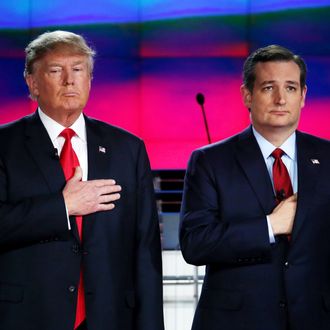
They used to be so good together. Whether they were holding hush-hush meetings in penthouse apartments, protesting the Iran deal on Capitol Hill, or stoking fears of Syrian war orphans in the media, you could always tell Donald Trump and Ted Cruz had a special connection — a certain je ne sais quoi that can only exist between two cynical politicians who want to use each other very much.
But that’s all over now.
The trouble began last week when Trump suddenly remembered that his good friend was born in Canada. (Coincidentally, this flash of insight came just as Cruz began outpolling the reality star in Iowa.) Anyhow, Trump has always had a deep scholarly interest in the constitutional requirements for presidential eligibility. And so he felt compelled to voice his concerns about the Texas senator’s qualifications for the Oval Office.
“I’d hate to see something like that get in his way,” Trump told the Washington Post last Tuesday. “But a lot of people are talking about it and I know that even some states are looking at it very strongly, the fact that he was born in Canada and he has had a double passport.”
On Monday, Harvard law professor Laurence Tribe wrote an op-ed on the subject of Cruz’s eligibility in the Boston Globe. Tribe argued that the proper interpretation of the “natural born” citizen clause is unsettled law, but that under his former student’s own judicial philosophy, no one born in Canada could ever legally occupy the White House.
“To his kind of judge, Cruz ironically wouldn’t be eligible, because the legal principles that prevailed in the 1780s and ’90s required that someone actually be born on US soil to be a ‘natural born’ citizen,” Tribe wrote. “Even having two US parents wouldn’t suffice. And having just an American mother, as Cruz did, would have been insufficient at a time that made patrilineal descent decisive.”
On Tuesday, Trump shared Tribe’s op-ed over Twitter.
Despite Trump’s clearly genuine interest in helping his good friend “solve this problem,” Cruz did not take the mogul’s tweet kindly.
There really is such a fine line between the strategic performance of love and hate.






























